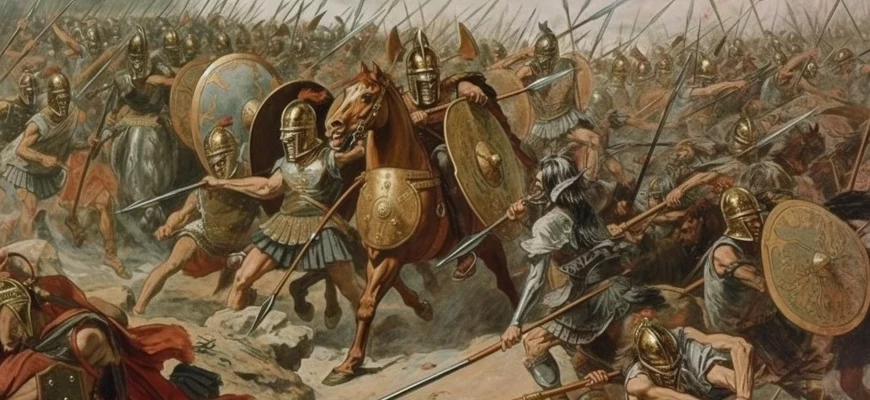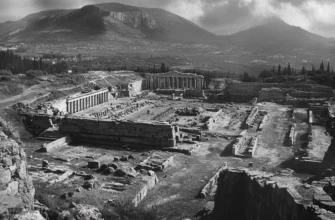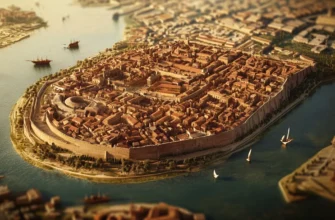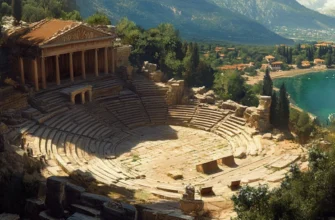The Peloponnesian War took place in the 5th century BC between the Athenian Empire and the Peloponnesian League, led by Sparta.
The main cause of the conflict was political and economic rivalry between Athens and Sparta. The Athenian Empire sought to increase its influence in Greece, while Sparta was interested in maintaining its power and control over the region.
The war consisted of four phases, during which both Athens and Sparta were victorious. However, at the end of the war, Sparta was able to win and conquer Athens.
The consequences of the Peloponnesian War were significant. The intensification of interethnic conflicts and the increase in the number of wars in Greece led to a decrease in Athens’ influence over Greece and the growth of Sparta’s hegemony. The war also had an important impact on the development of military strategy and tactics.
Thus, the Peloponnesian War was an important stage in the history of Greece and world history, which had a significant impact on the further development of civilization.
- Causes of the Peloponnesian War
- Political and economic competition between Athens and Sparta
- Attempts by the Athenian Empire to increase its influence in Greece
- The course of the war
- The first phase of the war: the successes of Athens at sea and Sparta on land
- The second phase of the war: the war turned into a pan-Hellenic conflict, involving new forces
- The third phase of the war: the rise of Sparta
- Fourth phase of the war: defeat of Athens and Spartan attack on Athens, end of the war
- Consequences of the Peloponnesian War
- Analysis of the war from a modern perspective
- Conclusion
Causes of the Peloponnesian War
The Peloponnesian War (431-404 BC) was a war between two Greek states, the Athenian Empire and the Peloponnesian League, led by Sparta. Although there were many reasons for the war, the main ones were as follows:
Territorial claims: Athens and Sparta fought for influence and control over regions of Greece, including Sicily.
Economic competition: Athens was a maritime power that controlled important sea routes, while Sparta was a land power with extensive territories. Each state sought to increase its resources and influence in the region.
Geopolitical reasons: The growing influence of Athens and the Peloponnesian League over Greece caused instability and exacerbated conflicts, which contributed to the outbreak of war.
Religious and cultural differences: The cultural and religious differences between Athens and Sparta also contributed to the conflict.
Thus, the Peloponnesian War was the result of many causes that had been building up for a long time and led to the deterioration of relations between Athens and Sparta.
Political and economic competition between Athens and Sparta
Athens and Sparta were two of the most famous city-states of Ancient Greece. They were able to achieve a high level of development thanks to their political and economic organization, as well as their armies, which enabled these city-states to compete politically and economically with each other.
Political competition between Athens and Sparta consisted of a struggle for influence over other city-states. Athens was known for its democratic institutions, where all citizens had the opportunity to participate in decision-making. Sparta, on the other hand, was an oligarchic state where power was held by a limited group of people. This difference in political systems was reflected in the relations between these city-states and their allies.
The economic competition between Athens and Sparta was reflected in the struggle for control over trade routes and resources. Athens was known for its developed navy, which allowed it to control trade in the Aegean Sea. Sparta, on the other hand, was known for its land armies, which gave it an advantage in warfare on land.
As a result, political and economic competition between Athens and Sparta was an important part of ancient Greek history. Both city-states were known for their achievements in politics, economics, and warfare, and they continued to compete with each other for many centuries. This competition for influence and control over territories and resources had a major impact on the development of politics and economics in Ancient Greece.
Despite their rivalry, Athens and Sparta were known for their high level of development and contribution to the culture and science of Ancient Greece. Athens was a center of philosophy and art, while Sparta was known for its military achievements and contribution to military tactics.
The rivalry between Athens and Sparta also gave other city-states the opportunity to develop and establish themselves in the region. During the period when these city-states were at the height of their power, other city-states, such as Corinth, were able to establish themselves and become influential in the region.
Thus, the political and economic rivalry between Athens and Sparta was an important element of Ancient Greek history. It reflected various aspects of life in Ancient Greece and enabled these city-states to achieve a high level of development and contribute to world history.
Attempts by the Athenian Empire to increase its influence in Greece
Athens is known for its attempts to increase its influence in Greece and create the Athenian Empire. Starting in the 5th century BC, Athens began to form alliances with other city-states in Greece, such as Samos, Chios, Lesbos, and others.
These alliances, known as the Delian League, allowed Athens to collect taxes from other member cities and control their politics. Athens also used its power to force other city-states to join the alliance.
However, these attempts to increase its influence in Greece were not always successful. In the 5th century BC, Athens was defeated by Sparta during the Peloponnesian War, which led to a decline in its power in Greece. However, after this war, Athens was able to increase its influence in Greece again and become one of the most powerful city-states.
Athens also attempted to expand its influence beyond Greece by conquering the island of Sicily in the 5th century BC. However, this led to war with Sparta and other city-states, which resulted in the decline of the Athenian Empire.
Thus, Athens’ attempts to increase its influence in Greece were an important part of its history. These attempts enabled Athens to become one of the most powerful city-states in Greece, but also led to conflicts and a decline in its power. Sparta and other city-states opposed the Athenian Empire and tried to reduce its influence in Greece.
In addition, Athens also pursued a policy of assimilation, or merging with other Greek peoples. They tried to turn other city-states into their vassals and spread their culture, language, and traditions. This helped Athens maintain its influence for many years after the end of the Peloponnesian War.
However, over time, Athens faced new challenges, such as Macedonia’s attempts to increase its influence in Greece. In the 4th century BC, Macedonia became the leading power in Greece, and Athens lost its role as the leader of the Greek world.
In the end, the attempts of the Athenian Empire to increase its influence in Greece were an important part of Greek history. These attempts allowed Athens to become one of the most powerful city-states in Greece, but also led to conflicts, a decrease in their power, and wars.
The ambitions of the city-states of Argos and Corinth
Argos and Corinth were two important city-states in Ancient Greece, which also had their own ambitions and attempted to increase their influence in the region.
Argos was known for its military strength and power in the 7th-6th centuries BC. They expanded their territories and defended their interests in many regions of Greece. One of their most significant achievements was establishing control over the Isthmus River, which allowed them to control trade between the Peloponnese and Attica.
Corinth was also known for its influence on Greek trade and economy. They were an important trading center that controlled trade in the Ionian and Aegean Seas. Corinth was also known for its fleet and military power.
When comparing Argos, Corinth, and Athens, it is clear that Argos and Corinth were less known for their cultural and intellectual achievements than Athens. They were better known for their military power and trade achievements.
Ultimately, the ambitions of Argos and Corinth were directed toward expanding their influence over trade and territory in Greece. These city-states were important factors in the political and economic life of Greece and helped shape Greek history.
The course of the war
The first phase of the war: the successes of Athens at sea and Sparta on land
The first phase of the Peloponnesian War (431-421 BC) was characterized by the successes of Athens at sea and Sparta on land.
In the initial phase of the war, Athens focused its efforts on naval operations. It had a powerful fleet that ensured its control over the Aegean Sea and the development of trade. The Athenian fleet also allowed it to move troops by sea and carry out raids on the western coast of Asia Minor.
At the same time, Sparta, a military state with a strong army, focused on land operations. It controlled a significant part of the Peloponnese and concentrated on capturing territories belonging to Athens and its allies.
As a result of these efforts, Athens was able to maintain its dominance at sea and remain the economic and commercial power of the region. However, Sparta won significant victories on land and managed to gain control over a large part of the territories that had previously belonged to Athens.
Thus, the first phase of the Peloponnesian War was characterized by the successes of both sides in various areas of combat operations. However, this led to a sharpening of the conflict and a further escalation of the war.
The second phase of the war: the war turned into a pan-Hellenic conflict, involving new forces
The second phase of the Peloponnesian War (415-404 BC) was characterized by the conflict between Athens and Sparta escalating into a pan-Hellenic conflict, which many other Greek city-states joined.
In 415, Athens attempted to capture Syracuse in Sicily, which led to a long and unsuccessful expedition that ended in defeat for Athens. This worsened Athens’ position in the war and drew many other city-states into the conflict, as they saw Athens as a threat to their independence.
Sparta managed to take advantage of this situation and draw many city-states of the Peloponnese to its side, which allowed it to conduct successful military operations on land and block Athens from the sea.
In addition, the war escalated from a simple war between states into a religious and cultural conflict. Sparta represented conservative and traditional Spartan culture, while Athens was a symbol of developed democracy and intellectual freedom. This led both sides to use religious and cultural arguments to mobilize the people to their side.
Thus, the second phase of the war was a period of pan-Hellenic conflict, which involved many city-states and led to a deepening of religious and cultural differences between Athens and Sparta.
The third phase of the war: the rise of Sparta
The third phase of the Peloponnesian War (404-371 BC) was a period of growing influence for Sparta in Greece and its victories in the war.
In 404, Athens was forced to sign a peace treaty with Sparta, which ended the war. Athens lost its possessions outside Attica and became dependent on Sparta.
Sparta became the main power in Greece and established its influence there. It created the Peloponnesian League, which controlled most of Greece, and pursued a policy of complete control over its vassals.
In 405, Sparta carried out a victorious military operation against Athens and its allies in the Battle of Aegospotami. This battle was the final blow to Athens and led to its complete subjugation to Sparta.
The third phase of the Peloponnesian War was a period of growing influence for Sparta in Greece and its victories in the war. Sparta became the dominant power in Greece and established its influence there, while Athens lost its power and became dependent on Sparta.
Fourth phase of the war: defeat of Athens and Spartan attack on Athens, end of the war
In the fourth phase of the Peloponnesian War (371-362 BC), Sparta continued its successful advance against Athens and its allies.
In 371, the Battle of Leuctra was fought, in which Sparta was defeated by Thebes, one of its enemies. This battle led to a complex political situation in Greece, as Sparta lost its status as an invincible power.
In 362, the Battle of Mantinea was fought, in which Sparta was again defeated by Thebes and its allies. This battle was the final blow for Sparta and led to the end of the war.
After the Battle of Mantinea, a peace treaty was signed, under which Sparta lost its control over Greece, and Athens and its allies regained their power and independence.
The fourth phase of the Peloponnesian War was a period of Spartan aggression against Athens and its allies, but ended in Spartan defeat and led to the restoration of power to Athens and its allies.
Consequences of the Peloponnesian War
The Peloponnesian War had a significant impact on the history of Greece and the entire ancient world. Below are some of the consequences of this war:
Decline of Spartan influence: Athens’ victory in the war led to a decline in Spartan influence in Greece. After the war, Sparta could no longer control the other Greek city-states and lost its status as a leading power.
Destruction of Athens: The war caused serious damage to the city-state of Athens, which lost its role as the leading center of culture and politics in Greece.
The rise of Macedonia: After the war, Macedonia became one of the leading powers on the Balkan Peninsula. Thanks to its strength and abilities, Macedonia was able to conquer northern Greece.
Change in the political landscape: After the war, many new rules were established that affected the political landscape of Greece. For example, the Corinthian League was created, which united several city-states.
Loss of power: The war caused serious damage to Greece, reducing its military and economic power. This was one of the reasons why the Greek Empire collapsed later on.
Overall, the Peloponnesian War had a serious impact on the political, economic, and cultural landscape of Greece and the entire ancient world, which can still be felt today.
Analysis of the war from a modern perspective
The Peloponnesian War is one of the most important events in the history of Greece and the ancient world as a whole. Although this war took place more than 2,500 years ago, it is still of great importance for our understanding of history, politics, and international relations.
One of the main causes of the conflict was the rivalry between the two leading city-states, Athens and Sparta, which represented two different political and social models. Athens was a democratic city-state that had a significant influence on culture and science, while Sparta was an oligarchic state consisting of a powerful military elite. This conflict between different political systems and social models could be useful for our understanding of how different political and social systems can clash and influence each other.
Another important aspect of the Peloponnesian War is the use of force and violence to resolve international conflicts. It was one of the first major wars in human history and showed how much can be lost as a result of violence and war. In our time, when our global community faces numerous challenges, from terrorism and economic instability to war and migration crises, it is important to learn how to resolve conflicts peacefully and seek compromises to achieve lasting peace and stability.
In addition, the Peloponnesian War demonstrated the importance of diplomacy and international relations. In this conflict, each side tried to win over other city-states to its side, using various methods of diplomacy and persuasion. This provided an opportunity to better understand the importance of developing international cooperation and good neighborly relations to ensure peace and stability.
It is also worth noting that the Peloponnesian War led to a great cultural and scientific expansion of Athens, which included the development of philosophy, science, art, and architecture. This was possible because Athens focused its efforts on the study and development of culture, while Sparta focused on military development and war.
In conclusion, the Peloponnesian War is an important event in human history that can provide us with useful lessons about politics, international relations, and culture. Studying this war can help us better understand how different political and social systems can interact and how important it is to develop international cooperation and good neighborly relations to ensure peace and stability.
Conclusion
The Peloponnesian War resulted in significant changes in the political and social structure of Greece, which influenced the further development of the country and its impact on world history. The war also demonstrated the importance of diplomacy and international relations in ensuring peace and stability.
The Peloponnesian War is also of great importance for the present day, as it provides an opportunity to better understand the political, social, and cultural processes taking place in the modern world. Studying this war will help to understand the importance of democracy and the development of international cooperation and peace for ensuring stability and prosperity.
Thus, the Peloponnesian War is an important event in world history, which is of great importance for understanding the present and for avoiding similar conflicts in the future.








